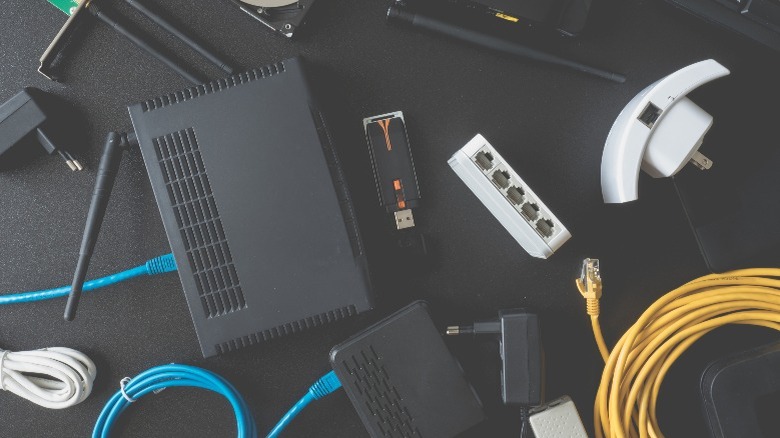The Risks You Take When Using These Discontinued Pieces Of Technology
There's a new iPhone released every year, and while the majority of the population doesn't require a year-on-year upgrade, the constant march forward of technology is the reason why we continue to receive better products that make life easier. The same is true for laptops, cameras, IoT devices, and even cars that now come with a slew of smart features. Even when you splash the cash on a new gadget such as a smartphone, it depends heavily on frequent software updates to unlock better ways to get things done.
A downside of this ever-evolving world of technology is that existing hardware and software tend to become outdated rather quickly. Apart from not being able to use the latest and greatest, there is notable risk in using and depending on obsolete pieces of tech, be it a certain version of software, or a physical device that's no longer supported by the original manufacturer. From popular but discontinued operating systems to something as inconspicuous as a Wi-Fi router — here are five products you should probably stop using, or look into upgrading.
Older versions of Windows and macOS
Computers and laptops are meant to last, and are something people hold on to for far longer than other gadgets they own. The modularity of PCs and reliability of Macs make them perfect machines to churn out daily tasks. While bottlenecks caused due to aging hardware is something that's noticeable and warrants an upgrade, it's easier to cling onto a familiar operating system.
We've seen the release of the much anticipated Windows 11 in late 2021 — and yet, it accounts for just under 30% of all Windows computers worldwide, according to Statcounter. At a staggering 68% market share, Windows 10 is still set to receive patches until 2025, but the third most popular version of the OS, Windows 7, has long since reached the end of its support cycle. It's no secret that Apple's offerings tend to last much longer, but if you're on an older machine running macOS Big Sur, you might want to look into upgrading.
Though a computer running an outdated operating system isn't going to magically break down and refuse to work, it's no longer going to receive security updates and vulnerability patches from the manufacturer — putting your device at a substantially greater risk of being infected with malware or other types of cyberattacks. If you own a Windows PC, check to see if you can upgrade to a newer version of the operating system. For Mac, consider picking a newer one up if support for your old device has been discontinued.
Outdated Android and iOS devices
The story is similar when it comes to the microcomputers in your pocket. Although people usually upgrade to a new phone more frequently than a computer, smartphone operating systems generally receive fewer years of software updates and security patches. Apple has had a great track record when it comes to software support for its products — the iPhone XR from 2018, for example, can be updated to the latest iOS 18. The same, unfortunately, isn't true on the Android side. While OEMs like Samsung and OnePlus have been keeping at it by providing at least three years of software updates for handsets, many affordable Android phones fail to push past two.
Running a much older version of iOS or Android on your phone gives rise to the same risks that running an outdated version of Windows or macOS on your computer does. Besides not being able to enjoy the latest software features, your data is put at significant risk. Fortunately, certain Android manufacturers offer an extra year or two of security updates, just be sure to check for software updates regularly. You will also eventually notice apps and services stop working, but it's a good idea to never push a version of Android or iOS that far.
Discontinued apps and services
Launched in the early 1990s, Adobe Flash is a name most have grown familiar to. Pretty much every website on the internet a decade ago relied heavily on this plugin to properly display various content types. At its core, Adobe Flash Player was a multimedia application that displayed animations and other types of graphics — making them compatible with various forms of computers. It's highly likely that you depended on Adobe Flash to run and play some of your favorite games on the internet.
Despite its immeasurable usefulness, Flash was a popular target among bad actors due to all sorts of security vulnerabilities. The internet has also moved to much faster and more efficient technologies, such as HTML5 and JavaScript, to reproduce most of what Adobe Flash could accomplish. Adobe finally pulled the plug on the Flash Player in 2020, and urges anyone who still has the plugin installed to get rid of it.
Another household name in the early days of the World Wide Web was Internet Explorer. It has since been replaced by Microsoft Edge, which boasts a comprehensive feature list and is based on the same technology as Google Chrome. Running Internet Explorer in today's age leaves a gaping hole in your security for frequent vulnerabilities, malware, and other cyberattacks to crawl in. The same principle applies to pretty much any piece of outdated software on your computer or smartphone, so be sure to check for any updates or alternatives to these services.
Old Wi-Fi routers and IoT devices
Staying updated and wary while using services on the internet is crucial — but the safety measures should also extend to the hardware your phones and computers connect to. Everyone is familiar with a Wi-Fi router — it is responsible for granting your smart devices access to the internet wirelessly, after all. Turns out, being a gateway to the internet makes them a popular pick for hackers to exploit. This is why you should probably retire ancient Wi-Fi routers, alongside other outdated pieces of tech in your house.
Routers and repeaters with outdated firmware and older technologies are at great risk of falling prey to security attacks. Not to mention, advancements in standards such as Wi-Fi 6 to Wi-Fi 7 also bring faster speeds and better bandwidth. Don't worry, there are plenty of resourceful ways to use an old Wi-Fi router, such as repurposing it as a guest network, or a VPN. Other IoT devices in your home, such as security cameras, smart doorbells, or anything that has access to your personal information, should also be updated to the latest available firmware, or be replaced with a newer model.




